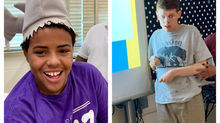Focus on Skills, Not Scores
- Lisa Mihalich Quinn

- Jul 18, 2023
- 3 min read
“How do you know my child understands what you’re saying to them?”
We hear this question a lot as we start working with new students. Students who have spent most, if not all of their lives, being labeled as many things they probably are not.
Intellectually disabled. Low functioning. Aggressive. Manipulative. Noncompliant.
When parents hear these things again and again, from professional after professional, it can be very convincing. When they see test scores that indicate low performance, low cognitive ability, low adaptive skills, they often start believing the numbers. It’s data, after all. And data doesn’t lie, right?
What happens in this process is that we lower our expectations. We adjust to the idea of the child represented by these labels.

Yet, at Reach Every Voice, when we begin working with students, we speak to them as if they are competent, capable learners. We don’t dumb down our talk or exclude them from our conversations. This can create a sense of unease as we challenge those long-worn labels.
It’s so important to address the question of “how do I know my child understands?” because what you see can look so convincing.
You might see a student not looking at the text. You might see your child playing the same youtube video on repeat a thousand times while you’re trying to talk to them. You might see your child waving their fingers in front of their eyes or fleeing to a corner to jump or rock. This all looks like a child who doesn’t understand what’s going on around them.
At the same time, we hear from parents and teachers alike who all say, “I just KNOW there’s so much more in there, but he’s not able to show us.” or “I know he’s really smart! But he keeps getting things wrong.”

This is a great place to learn more about the brain-body disconnect. There is a lot to learn about apraxia and dyspraxia, and a lot of brilliant resources for you to reference, but we’ll send you to this quick video, made by our friend Julie Sando at Autistically Inclined.
At the point of introducing children to more complex, age-appropriate skills, we need to let go of the notion that students need to PROVE understanding before they’re allowed access.
Read that again. Students do not need to prove they understand before they are allowed to access real education.
We talk a lot about the idea of the least dangerous assumption being to presume our students are competent and capable learners. If we deny students access to richer texts and ideas because we think they don’t understand them, and later we’re proven very wrong, that would be infinitely more harmful than providing access without understanding.
Remember that just because a child isn’t able to show us reliably what they know, it does not mean that they do not know it. Remember that students are often working with unreliable sensory-motor systems and require assistance with regulation and instruction in purposeful movement before they can show what they really know.
But that doesn’t mean we’re going to assume your child knows everything. Remember, they’re children! We always advocate presuming competence, not knowledge.
Let go of making your child or student prove they know or understand something before exposing them to age-appropriate information. Just read to them. Talk to them. It’s not about getting them to show you - it’s about you sharing the beautiful knowledge of the world without expecting anything in return at first.
Just start GIVING to them. We’re trying to focus on developing skills, not scores.
Does this resonate with you?
Want to take steps to focus on skills, not scores?
Check out Accessible Academics, our self-paced course that teaches and models how to break down real, age-appropriate education tasks for students who don’t use speech as their primary means of communication.


























.png)

.png)



.png)


Comments